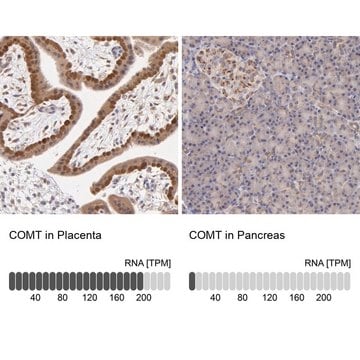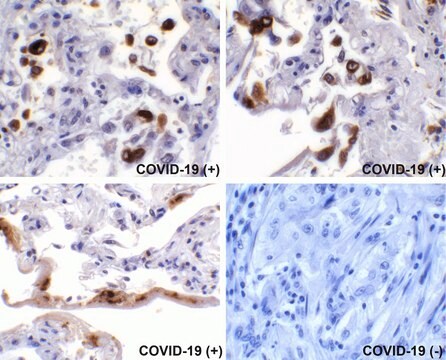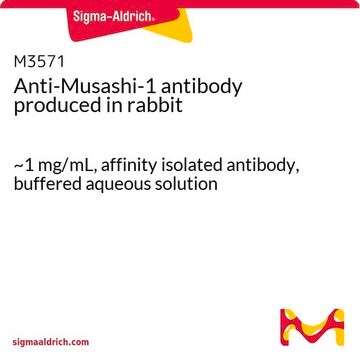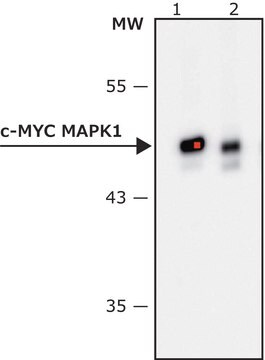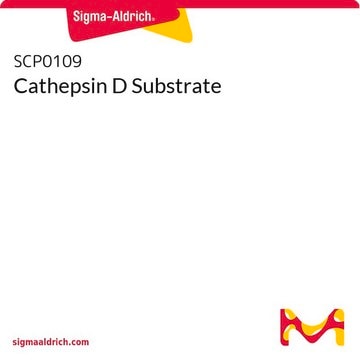05-536
Anti-IKKα Antibody, clone 14A231
clone 14A231, Upstate®, from mouse
Sign Into View Organizational & Contract Pricing
All Photos(1)
About This Item
UNSPSC Code:
12352203
eCl@ss:
32160702
NACRES:
NA.41
Recommended Products
biological source
mouse
Quality Level
antibody form
purified immunoglobulin
antibody product type
primary antibodies
clone
14A231, monoclonal
species reactivity
human, monkey, mouse
manufacturer/tradename
Upstate®
technique(s)
western blot: suitable
isotype
IgG1
NCBI accession no.
UniProt accession no.
shipped in
dry ice
target post-translational modification
unmodified
Gene Information
human ... CHUK(1147)
Specificity
Recognizes IKKα.
Immunogen
His-tagged, full length human IKKα
Application
Anti-IKKα Antibody, clone 14A231 is an antibody against IKKα for use in WB.
Research Category
Signaling
Signaling
Research Sub Category
Immunological Signaling
Immunological Signaling
Quality
routinely evaluated by immunoblot on RIPA lysates from Jurkat cells
Target description
85 kDa
Physical form
Format: Purified
Protein G purified IgG1 in PBS containing 0.05% sodium azide.
Storage and Stability
Maintain for 2 years at -20°C from date of shipment. Aliquot to avoid repeated freezing and thawing. For maximum recovery of product, centrifuge the original vial after thawing and prior to removing the cap.
Analysis Note
Control
Positive Antigen Control: Catalog #12-309, Hela cell nuclear extract. Add an equal volume of Laemmli reducing sample buffer to 10 μL of extract and boil for 5 minutes to reduce the preparation. Load 20 μg of reduced extract per lane for minigels.
Positive Antigen Control: Catalog #12-309, Hela cell nuclear extract. Add an equal volume of Laemmli reducing sample buffer to 10 μL of extract and boil for 5 minutes to reduce the preparation. Load 20 μg of reduced extract per lane for minigels.
Legal Information
UPSTATE is a registered trademark of Merck KGaA, Darmstadt, Germany
Disclaimer
Unless otherwise stated in our catalog or other company documentation accompanying the product(s), our products are intended for research use only and are not to be used for any other purpose, which includes but is not limited to, unauthorized commercial uses, in vitro diagnostic uses, ex vivo or in vivo therapeutic uses or any type of consumption or application to humans or animals.
Not finding the right product?
Try our Product Selector Tool.
Storage Class Code
12 - Non Combustible Liquids
WGK
WGK 2
Flash Point(F)
Not applicable
Flash Point(C)
Not applicable
Certificates of Analysis (COA)
Search for Certificates of Analysis (COA) by entering the products Lot/Batch Number. Lot and Batch Numbers can be found on a product’s label following the words ‘Lot’ or ‘Batch’.
Already Own This Product?
Find documentation for the products that you have recently purchased in the Document Library.
Se-Ran Yang et al.
American journal of respiratory cell and molecular biology, 40(2), 147-158 (2008-08-09)
The activation of transcription factor NF-kappaB is controlled by two main pathways: the classical canonical (RelA/p65-p50)- and the alternative noncanonical (RelB/p52)-NF-kappaB pathways. RelB has been shown to play a protective role in RelA/p65-mediated proinflammatory cytokine release in immune-inflammatory lymphoid cells.
Willie Wilson et al.
Cancer research, 68(19), 8156-8163 (2008-10-03)
Constitutive nuclear factor kappaB (NF-kappaB) activation is among the many deregulated signaling pathways that are proposed to drive pancreatic cancer cell growth and survival. Recent reports suggest that glycogen synthase kinase-3beta (GSK-3beta) plays a key role in maintaining basal NF-kappaB
Hong Dong et al.
Proceedings of the National Academy of Sciences of the United States of America, 119(26), e2123247119-e2123247119 (2022-06-24)
Mitochondria, a highly metabolically active organelle, have been shown to play an essential role in regulating innate immune function. Mitochondrial Ca2+ uptake via the mitochondrial Ca2+ uniporter (MCU) is an essential process regulating mitochondrial metabolism by targeting key enzymes involved
IkappaB kinase: beginning, not the end.
Verma, I M and Stevenson, J
Proceedings of the National Academy of Sciences of the USA, 94, 11758-11760 (1997)
Daniela S Bassères et al.
Genes & cancer, 5(1-2), 41-55 (2014-06-24)
Activating mutations in KRAS are prevalent in cancer, but therapies targeted to oncogenic RAS have been ineffective to date. These results argue that targeting downstream effectors of RAS will be an alternative route for blocking RAS-driven oncogenic pathways. We and
Our team of scientists has experience in all areas of research including Life Science, Material Science, Chemical Synthesis, Chromatography, Analytical and many others.
Contact Technical Service
